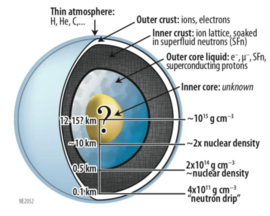Neutron stars multi-messenger observations as nuclear physics laboratories, Sébastien Guillot
Le 22 nov 2019 de 11h00 à 13h00
Neutron stars are the extremely dense compact remnants of supernova explosions. Their properties makes them wonderful objects to study the behaviour and composition of matter in regimes not accessible by Earth laboratories (densities beyond the nuclear densities, ~2×1014 g/ cm3). Determining the dense matter equation of state, the relation between the pressure and the density of dense matter is a key question of fundamental physics. It remains unknown whether matter at extreme densities is composed of neutrons, or whether exotic particles such as free quarks appear at the largest densities. Different types of neutron star systems offer a variety of methods to determine this equation of state and understand the composition of dense nuclear matter. To achieve this requires determining the masses and radii of neutron stars, and the various observational techniques that exist involve isolated neutron stars, or neutron stars in binary systems. So far, precise measurements of masses have been obtained from observations, while measurements of the radius are more uncertain due to the difficulty of such studies. This seminar will present in some details these observational methods, some of the current results, and prospects for the future. Last year, the observed merging event of two neutron stars demonstrated that some information on the masses and radii of neutron stars could be extracted from the emitted gravitational wave signal of such mergers. The seminar will also discuss the constraints on the dense matter equation of state that one can extract from observations of neutron star – neutron star mergers.





